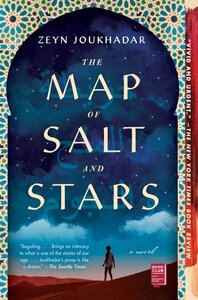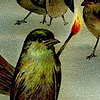Take a photo of a barcode or cover
For me, the better part of this book was the contemporary experiences of Nour and her family in Syria. It brought depth and humanity to a conflict we often only see snippets of on the news. The tale of Rawiya and Al-Idrisi was okay, but lacked continuity as a true mirror to the contemporary storyline. Interesting plot device though.
The writing was good, but the story sort of dragged in the beginning for me. I didn’t enjoy the intermingling of the fable; I think the story could have stood without it. Certainly a sad story, at times painful; the difficulties faced by refugees are things I cannot fathom.
“My whole life, Mama and Baba celebrated two religions' worth of holidays—Christmas, Eid al-Fitr, Easter. It used to make me wonder whether the most important things we see in God are really in each other.”
I have read a number of books on immigration. For awhile, I felt like much of my reading about immigration was historical. Now it seems like I am reading about current events. Unfortunately, the immigrant experience seems to be getting harder and harder. Wars don’t end. Violence, hunger and basic life needs don’t end either.
Last year I read Mohsin Hamid’s novel, Exit West. I did not expect to find another book about immigration that I would like as much as that one. Not that the book was a fun book. Hamid as well as Joukhadar knows that being displaced is not an easy life. It was just that Hamid wrote so well that I thought I was living with his characters. I learned from that story.
Joukhadar has written a very different novel. He has combined a folk tale from the past with what is going on in Syria now. All the main characters in both stories are travelers. Nour, the young woman in contemporary story has had a tough life. The folk story is one she has heard from family and it helps Nour make sense of her own life. I liked the construction of this novel – it helped me make sense of the fragility of life, families and countries. I am grateful to Joukhadar for telling this double-sided tale.
If you are at all interested in the turmoil in Syria, in stories about families who love one another or you like tales of ancient peoples – you will find something in this novel to entertain and educate you. This is an excellent first novel.
I have read a number of books on immigration. For awhile, I felt like much of my reading about immigration was historical. Now it seems like I am reading about current events. Unfortunately, the immigrant experience seems to be getting harder and harder. Wars don’t end. Violence, hunger and basic life needs don’t end either.
Last year I read Mohsin Hamid’s novel, Exit West. I did not expect to find another book about immigration that I would like as much as that one. Not that the book was a fun book. Hamid as well as Joukhadar knows that being displaced is not an easy life. It was just that Hamid wrote so well that I thought I was living with his characters. I learned from that story.
Joukhadar has written a very different novel. He has combined a folk tale from the past with what is going on in Syria now. All the main characters in both stories are travelers. Nour, the young woman in contemporary story has had a tough life. The folk story is one she has heard from family and it helps Nour make sense of her own life. I liked the construction of this novel – it helped me make sense of the fragility of life, families and countries. I am grateful to Joukhadar for telling this double-sided tale.
If you are at all interested in the turmoil in Syria, in stories about families who love one another or you like tales of ancient peoples – you will find something in this novel to entertain and educate you. This is an excellent first novel.
adventurous
emotional
hopeful
sad
medium-paced
Plot or Character Driven:
A mix
Strong character development:
Yes
Loveable characters:
Yes
Diverse cast of characters:
Yes
Flaws of characters a main focus:
No
Graphic: Death, Gun violence, Violence, Blood, Grief, Death of parent, Fire/Fire injury, War, Injury/Injury detail
Moderate: Animal death, Child death, Confinement, Gore, Physical abuse, Sexual assault
Minor: Cancer, Vomit
Bombing and aftermath. Single, relatively brief scene of attempted rape.
It took me about half way through the book before I really got into it and the story of Nour and her family really grabbed me. The second timeline of Rawiya was relayed in the "telling" mode with quite of bit of unexplained political history and turmoil between empires I would have loved to know more about. They moved so fast between the fascinating places they went, it was hard to really feel their journey too much. There was only a brief few paragraphs about finding the forgotten city of Petra! Nour's family journey was heart breaking, and beautifully written and a perspective I enjoyed experiencing. My only complaint would be so many metaphors, and poetic unanswerable questions, which I would have found so much more delightful if they were not everywhere! Just a few sprinkled through the book would have made it stronger.
4.5 stars. Such a wonderful read with beautiful prose and rich storytelling. It takes you on a voyage of history and culture and heartbreak and really connects you to the heartbeat of that part of the world. There are some small prose wobbles but I feel like for the debut it was an amazing feat and I'm looking forward to reading more works by this author.
adventurous
emotional
informative
sad
tense
medium-paced
Plot or Character Driven:
A mix
Strong character development:
Yes
Loveable characters:
Yes
Diverse cast of characters:
Yes
Flaws of characters a main focus:
No
Great concept and idea, but sadly the execution wasn't for me. It didn't keep my attention fixed for long at a time.
I will read anything Zeyn Joukhadar writes. There is so much to love about this book. The messy relationships between sisters is portrayed so well. Seeing conflict through the eyes of a child is really interesting, because so much of her reactions seem normal for any adult, especially the intense wariness of any stranger (which is sometimes necessary and is sometimes proven wrong).
I read this book around the time millions of Ukranians have become refugees after Russia's invasion, and there are a lot of comparisons to how the media and world at large is reacting to (mostly) white refugees from Europe compared to the millions of Syrian refugees who needed (and still need) aid.
I read this book around the time millions of Ukranians have become refugees after Russia's invasion, and there are a lot of comparisons to how the media and world at large is reacting to (mostly) white refugees from Europe compared to the millions of Syrian refugees who needed (and still need) aid.
I had very high expectations for this book. They didn't quite come true, but I still enjoyed it. I had some issues with the writing. It wasn't bad, not at all, but there were so many metaphores that it was distracting at times and kept me from really getting into the story. In the first half of the book I also didn't feel a need to get back to it, but at some point that changed and suddenly I found it much harder to put down. Also, and I loved learning about Al-Idrisi, who actually was a real map maker back in the 1100s.


